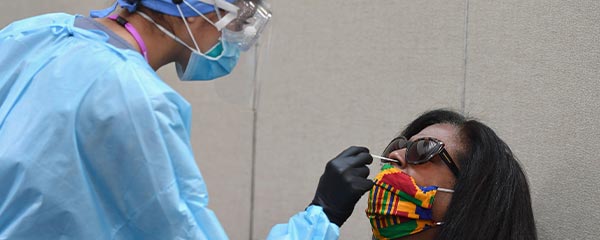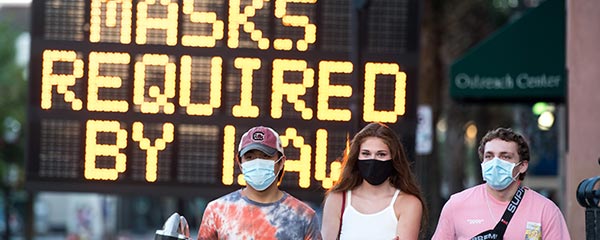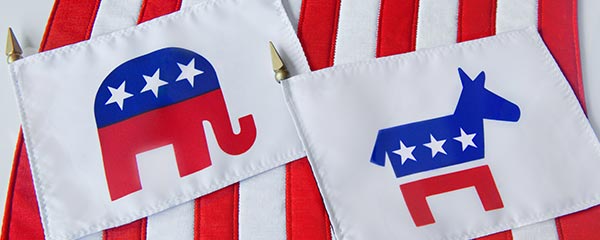Americans' political identities provide a lens through which they view and interpret much of what goes on around them, including not only views of the government, but also opinions about the economy, the state of the nation, race relations, schools and healthcare. The COVID-19 situation is no exception. It is now an accepted verity that Republicans and Democrats have major differences in how they approach the virus. We see continuing news and media reports focused on partisan differences in mask-wearing, as a primary example, but other reports highlight differences in a variety of other virus-related attitudes and behaviors. Gallup Panel data confirm that Republicans are much more optimistic about the virus situation than Democrats and are less likely to report social distancing.
I looked at these differences in some detail two months ago, exploring possible reasons why Democrats and Republicans view virus-related issues and self-reports of virus-related behaviors differently. As is true with many aspects of public opinion, it is a complex picture. The partisan differences reflect the cues partisans get from political leaders on issues they (the public) are not equipped to assess themselves, the impact of underlying differences in philosophies of the role of government, and underlying differences in confidence in the views of political and scientific elites.
A recent study by Stanford researchers underscored the particular importance of differential messages received by Republicans and by Democrats, concluding: "While our evidence does not permit us to pin down the ultimate causes of partisan divergence [in attitudes and behavior relating to the virus], these patterns are consistent with divergent messaging playing an important role in driving differences in beliefs and behavior." A Gallup analysis reported last month confirms that partisan differences in the ways Americans understand and react to the virus are at least "partly attributable to news consumption habits." But which messaging matters most? A closer analysis of recent Gallup data on COVID-19 provides some insights in answer to that question.
The most dramatic partisan difference is in terms of views of how President Donald Trump is handling the COVID-19 situation -- very predictable, but at the same time, very important. Gallup asks Americans on its nightly panel tracking to evaluate Trump (along with the CDC and state governors, as we will see presently) in terms of confidence in his handling the virus, his communication of a clear plan of action for dealing with the virus, and his caring about the safety and health of people in the local community. The Republican versus Democratic gap in agreement that Trump does these three things is in the 70-80% range (based on recent July 13-26 data), similar to the partisan gap in his overall job approval rating (as measured in separate surveys). To be specific, 88% of Republicans agree they have confidence in Trump to manage the virus crisis, 85% say that Trump cares, and 75% of Republicans agree that Trump has communicated a clear plan of action. In all three instances, a negligible 1% of Democrats agree.
These differences between Republican and Democratic views of Trump are particularly striking in comparison to the much smaller partisan differences when the same questions are asked about the CDC. The gaps between Republicans and Democrats in agreement that the CDC has a plan, cares, and creates confidence range only between 4 and 12 percentage points. There is a similarly small gap in Americans' overall responses to these questions relating to their state governor, but this average obscures the fact that Republicans and Democrats give much higher ratings to their governor if that governor matches their party affiliation.
So, it does not look like the partisan differences in attitudes about the virus or differences in virus-related behavior are strongly related to differential confidence in or interpretation of messages coming from the CDC. On the other hand, it is likely the differences do reflect the widely differing ways that Republicans and Democrats interpret messaging from Trump. It's also possible that the partisan gap is sustained by the differing ways that Republicans and Democrats assimilate messaging from state governors, depending on the match between the party of the individual and the party of the governor.
Relatively few Americans of any political persuasion interviewed by Gallup report having taken a COVID-19 test, having had COVID-19 symptoms or having a household member who has taken a test. (Those with serious symptoms, of course, are less likely to be answering survey questions.) There do not appear to be major differences by party identification among those who have been tested or reported symptoms. There are also not large differences between Republicans and Democrats in terms of their self-reports of disruptions in their personal lives caused by the virus. Republicans are, however, much more positive when asked about how long the disruption may last. These findings suggest that the partisan differences we find on attitudinal and behavioral measures relating to the virus are not reflective of real-world personal exposure or inconvenience caused by the virus.
The afore-mentioned Stanford study looked at geographic location, socioeconomic status and other variables concerning the virus and found that attitudinal and behavioral differences persist even when these are controlled for. A recent interview with one of the study's authors confirms that the differences, although moderated as the impact of the virus has shifted geographically, still exist.
As I indicated in my previous review, the impact of political orientation on views of the virus occurs, in part, because average people don't have the ability to personally assess the science and facts involved. In these circumstances, Americans resort to cues from trusted sources -- often mediated through the media -- to help formulate opinions about the virus and to make decisions on personal behavior. And the source with the largest "trust gap" is President Trump, certainly making it likely that his statements and positions are a significant factor behind partisan differences.
What might reduce the partisan gap in the future? Obviously, Trump could change his positions and statements on the virus, which in turn might affect how Republicans think and behave, given the very high levels of confidence they have in what he says and does. This appears to be exactly what Trump is doing with his "embers strategy" -- in which he is taking steps to show that he and his administration are dealing with the virus and emphasizing its importance. As Trump recently announced: "My administration will stop at nothing to save lives and shield the vulnerable, which is so important ... We are in the process of developing a strategy that's going to be very, very powerful … Some areas of our country are doing very well; others are doing less well. It will probably, unfortunately, get worse before it gets better -- something I don't like saying about things, but that's the way it is." It remains to be seen whether Trump sustains this changed approach and how much it ultimately will affect Republican attitudes.
The partisan gap could also, in theory, be reduced if conservative (or liberal) media change how they report on Trump. Democrats could become more trusting in Trump, or Republicans could become less trusting in Trump -- but these types of changes have a relatively low probability of occurring in today's hardened and polarized environment. Or continuing changes in the real-world impact of the virus could affect how both Republicans and Democrats think and act, regardless of cues they are receiving from trusted thought leaders.




